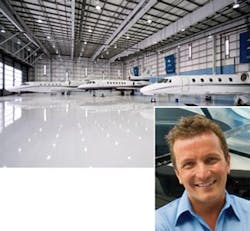ENGLEWOOD, CO — It’s all about the gold keys. As a professional concierge, Stuart Kupfer is one of only a couple hundred of his brethren to have earned his, worldwide. This, he explains, is the XJet difference. The quasi-FBO caters first to the aircraft owners who are quite familiar with Gold Key services at the hotels and restaurants they patron. They pay membership fees of $60,000 to $100,000, it’s reported, to be an XJet based customer, and they get their fuel at cost. But they are buying more than first-class service from a fixed base operator, explains Kupfer. “It’s really a lifestyle solution,” he says. The second XJet is being built in Grand Rapids, MI; the next, most likely in Dubai — then Chicago, Dallas, Paris, and China. The plan: Build a networked global lifestyle solution.
XJet’s pro forma operation is located at Centennial Airport south of Denver, and it was the high level of interest by local oil interests that persuaded the man behind the idea, Josh Stewart, to move beyond his original target (Florida) and establish his first base here.
On this day, a tour of the facility is led by Kupfer [pronounced ‘Cooper’], who is nothing if not gracious as a guide. A native South African, his pedigree includes posh assignments in Beverly Hills (with a bit of advice from Elizabeth Taylor, among others), directing concierge services at the Broadmoor Hotel in Colorado Springs, and he continues to operate www.cityconcierge.org, a visitors and meetings website he founded.
“As Josh puts it, it’s beyond the aircraft,” he explains. Instead of focusing on pilots and related incentive programs, the XJet model calls for catering to the aircraft owner — the lifestyle angle.
He explains by example:
“This gentleman called me and I remember that the readout on the phone said the call took 6 minutes, 38 seconds. And in that time he told me what he needed, and that was accommodations in Vienna, Budapest, and London; the dates; he needed transportation in all three places, 24 hours, on-call. He told me of dining reservations he needed; and that he needed a massage, in-room, at each; and he wanted an exercise bike in his room in every place he traveled.
“The next time I interfaced with him was when his plane was on the ramp and he and his assistant arrived. We sat down on the plane – that’s the only time that I’ll burst their bubble and actually enter the fuselage. I believe that once they’re on that plane they’re inside their own living room — it’s their’s. But I burst the bubble for just that moment, and he expected it, and I had his itinerary all ready to go and we went through it page by page.
“The point is, in 6 minutes and 38 seconds, his whole trip was set by one phone call.”
Example Number 2:
“A member called me at 5:30 p.m. on Wednesday for a New York trip lasting four days; he wanted hotels, restaurants, shows, and transportation. He left the next day at noon. Of the nine reservation requests, including the hotel, seven were sold out. And he got every single one. It’s part of the fabric of never say never; just do it.”
It helps, he relates, to have that gold key status. “By being a gold key concierge, I speak the concierge’s language,” he says. It helps to get things done for the client, the core message of the customer service training he oversees for what is expected to become a global network. It’s about seven-star service.
“Service levels in the U.S. and worldwide aren’t what they can be,” he says. “There’s an opportunity right now to offer something that’s special.
“Five-star service is never say no, and offer a reasonable alternative. Seven stars is, you get it done.”
A unique business model
Josh Stewart is Irish born — living the American dream, he says. Central to his model of catering to the aircraft owner class, he needed buy-in. He got that from Denver oil money — Alex Cranberg and wife Susan Morrice, both successful oil industry entrepreneurs — who are XJet’s primary financial backers. A dinner with aircraft owners in Denver not only led to finding his primary investors, but it helped refine the concept.
Explains Stewart, “It’s always great to have investors who are the end-users of the product. They are jet owners and operators and they’ve been underserved in the past with facilities and service. They helped me brainstorm the idea and refine it.”
While the initial model was on high-end service, along the way Stewart discovered that the central bargaining point, or motivation for buy-in, revolved around fuel. “We did our market research, and what annoys a lot of our members is that they view jet fuel as a commodity, and it’s an expensive commodity. It’s typically the second biggest cost of operating a private jet. And they were paying these huge premiums for a commodity and not really seeing a lot of the service or facility.
“We thought, let’s treat jet fuel purely as a commodity. Strip out all the profit margin and put it in the plane as cheaply as possible, and let’s focus our two revenue streams on facilities and service.
“Thereby, we have to focus on building the finest facilities and delivering the outstanding customer service.”
The Denver operation has some 30 based members, who will have a private club and seven-star restaurant available to them. The concept, says Stewart, is to connect Denver to Chicago, Michigan, Dallas, Dubai, Europe, Asia, and beyond. A level of service, worldwide.
“That’s exactly the aim,” he says. “It’s a very structured approach to our expansion. Denver worked very well; we were pre-sold. We’re now keen on getting a European hub, a Middle Eastern hub, and other U.S. locations. And then really connect this network of global excellence. That also increases our buying power, so the bottom line will see bigger savings.”





